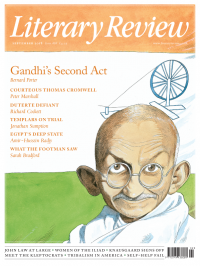Allan Massie
Law by Name, Lawless by Nature
John Law: A Scottish Adventurer of the Eighteenth Century
By James Buchan
MacLehose Press 513pp £30
James Buchan gives his life of John Law the subtitle ‘A Scottish Adventurer of the Eighteenth Century’. ‘Adventurer’ is a more polite term than some that have been applied to Law: fantasist, scoundrel, con man and crook, for example. Others, more generously, have called him an idealist, a financier of genius and an economist ahead of his time. There is a case to be made for any, even all, of these descriptions. While there were times, reading this wonderfully rich and entertaining, if also demanding biography, I found myself comparing Law to John le Carré’s con-man father, Ronnie Cornwell – so daring in his schemes, so fertile in invention, so extraordinarily resilient – there were others when it was John Maynard Keynes, someone who addressed questions of political economy with uncommon penetration and virtuosity, who came to mind.
The outline of Law’s life may be given briefly. He was born in 1671 in Parliament Close, Edinburgh, a few yards from the High Kirk of St Giles. His father was a master goldsmith who did so well that he went into property development and private banking (in other words moneylending). He bought a small estate between the city and the Firth of Forth, so that in time John Law was able to call himself Law of Lauriston, though he would spend all his adult life away from Lauriston and Scotland.
Like many ambitious young Scots even before the 1707 Act of Union, Law went south to London in search of fortune. He travelled with a cousin, John Campbell, who flourished as a goldsmith and banker, his business eventually growing into the famous bank Coutts & Co. Buchan admits

Sign Up to our newsletter
Receive free articles, highlights from the archive, news, details of prizes, and much more.@Lit_Review
Follow Literary Review on Twitter
Twitter Feed
The son of a notorious con man, John le Carré turned deception into an art form. Does his archive unmask the author or merely prove how well he learned to disappear?
John Phipps explores.
John Phipps - Approach & Seduction
John Phipps: Approach & Seduction - John le Carré: Tradecraft; Tradecraft: Writers on John le Carré by Federico Varese (ed)
literaryreview.co.uk
Few writers have been so eagerly mythologised as Katherine Mansfield. The short, brilliant life, the doomed love affairs, the sickly genius have together blurred the woman behind the work.
Sophie Oliver looks to Mansfield's stories for answers.
Sophie Oliver - Restless Soul
Sophie Oliver: Restless Soul - Katherine Mansfield: A Hidden Life by Gerri Kimber
literaryreview.co.uk
Literary Review is seeking an editorial intern.